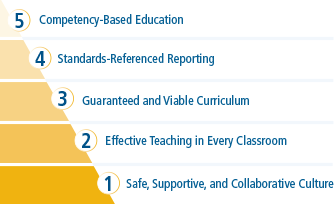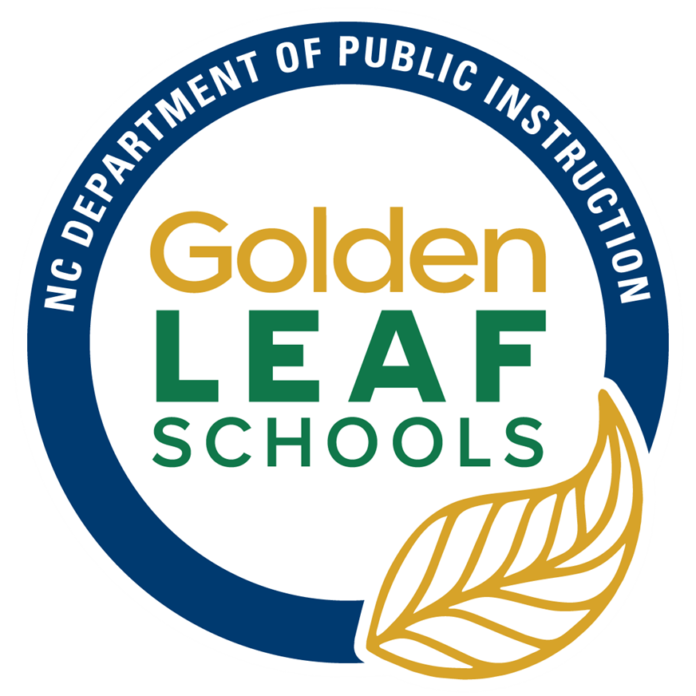Earlier this month, state Superintendent Mo Green announced the Golden LEAF Schools Initiative, a five-year project that will support 20 middle schools in rural North Carolina counties.
The Golden LEAF Foundation, which is funding the project, is a private nonprofit organization established in 1999. It receives a portion of North Carolina’s funding from the 1998 Master Settlement Agreement with cigarette manufacturers. According to the foundation’s website, it has worked to increase economic opportunity in North Carolina’s rural and tobacco-dependent communities.
According to presenters at a Jan. 8 State Board of Education meeting, the project has been in the works for 18 months. Green thanked former Superintendent Catherine Truitt for her “pivotal role” in developing the initiative.
Below is a collection of information on the Golden LEAF Schools Initiative. Much of it is taken from the Department of Public Instruction’s (DPI) Golden LEAF Schools web page and the Golden LEAF Schools Request for Proposal (RFP) document.
What is the Golden LEAF Schools Initiative?
The initiative, which is funded to the tune of $25 million, is aimed at “improving school performance through innovative education strategies,” according to a DPI press release.
Specifically, it will target educational improvement, school culture, pedagogy, leadership, math instruction, and career readiness.
Schools selected by the State Board of Education will be split into two cohorts: Ten schools designated as low-performing will be selected for the Transformative Schools Cohort (TSC) and 10 schools will join the Personalized Competency-Based Education Cohort (PCBE).
“Since the PCBE schools have existing structures and leadership in place, they will receive supplementary support rather than comprehensive support,” according to the RFP document.
The Transformative Schools Cohort
Schools in the TSC will receive access to the Marzano High Reliability Schools Model, which “shows how best practices work together and provides indicators to empower districts and schools to measure their progress on attaining five increasing levels of reliability,” according to the Marzano Resources website.

TSC schools will also receive coaching in leadership, mathematics, and formative assessment; implementation support for a research-based math curriculum; and professional development resources for teachers.
Funds will be available for stipends for teachers participating in professional development outside of school hours, and for retention and performance bonuses for principals. Each school will receive up to $1.8 million in total funding for resources.
According to the DPI web page and other messaging about the Golden LEAF Schools Initiative, there will be a focus on career development for students aligned with the Portrait of a Graduate Durable Skills framework.
The Personalized Competency-Based Education Cohort
The PCBE’s long-term vision is to provide “support to institutionalize personalized learning approaches, fostering innovation and student-centered education that aligns with future-ready competencies.”
That will look like customized coaching sessions for schools, participation in professional development, potential stipends for teachers, and travel funds to foster collaboration. Each school will receive up to $390,400 in funding.
Both TSC and PCBE schools will be encouraged to network with each other and other educators, as well as attend national events to share best practices.
Eligibility criteria
TSC schools must:
- Be in a district in a rural county with persistent Tier 1 or Tier 2 status.
- Be a low-performing middle school that serves grades 6-8.
- Have their district superintendent commit to support the initiative and participate in an interview with a selection committee at DPI.
- Have their principal commit to serve as principal for the duration of the grant (five years).
PCBE schools must:
- Be in a district in a rural county with persistent Tier 1 or Tier 2 status.
- Be a middle school that serves grades 6-8 that can demonstrate readiness to begin at least at a Level 3 on Marzano’s HRS progression.
- Have their district superintendent commit to support the initiative and participate in an interview with a selection committee at DPI.
- Have their principal commit to serve as principal for the duration of the grant (five years).
See the Golden LEAF Schools Eligibility and Selection Criteria document for full details.
Application information
Why apply?
“This initiative offers a rare combination of financial support, professional development, resources and incentives that can significantly enhance school performance and student outcomes, especially in rural and economically distressed areas,” the DPI web page says.
Applications must be submitted by 5 p.m. on March 21, 2025 via either the TSC Google Form or the PCBE Google Form. Applicants will provide a statement of need, assurances of leadership capacity, descriptions of pressing challenges, and information on the principal and superintendent of the school/district.
See the RFP document for full details.
Learn more
Informational webinars are scheduled to support schools interested in applying for grants. The first thirty minutes will provide information about the Golden LEAF Schools Initiative, and the remaining thirty minutes will allow potential applicants to ask questions.
Office hours will be held every Friday until March 21, except for Friday, Jan. 31.
Links to past recorded sessions and upcoming sessions are available in the RFP document and on the DPI web page.





